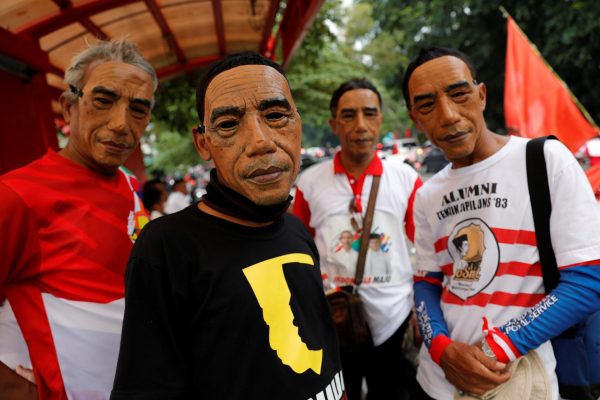Prabowo is a grossly inappropriate choice for the defence portfolio. After former president Suharto’s resignation he was dismissed from the military for organising the abduction and torture of anti-regime activists, and he faces serious questions over his role in atrocities during the occupation of East Timor.
Western governments are unlikely to care — Prabowo recently expressed the right concerns about an ‘ever-expansive’ China and will be a reliable ally in the fight against terrorism. He sidelined his election-time alliances with Islamic hardliners in favour of reconciliation with the nationalist and moderate Islamic parties that dominate Jokowi’s coalition. But Prabowo is ambitious, and nobody knows whether he is joining the government in order to white-ant it or to inherit it when Jokowi leaves office in 2024.
The circumstances of Prabowo’s return to public office are emblematic of some broader pathologies of post-Suharto politics. Democratic accountability traditionally rests on the idea that the public votes leaders and parties out of office as much as into it. But in Indonesia, ideological and political economy factors encourage the formation of oversized ruling coalitions, of the kind Jokowi has pursued, that are designed to accommodate a broad swathe of elite factions and social groups — including the national election ‘losers’.
Announcing the new cabinet, Jokowi condemned ministerial corruption, but he knows that opportunities for rorts are the point of these ‘fat’ coalitions and kickbacks collected in this process are an important source of operational funds. The prospect of controlling a ministry and its budget is one reason why, though parties compete vigorously with each other in elections, they then enter ‘power-sharing agreements that effectively void voters’ preferences’.
The new cabinet also adheres less to the tradition of representational diversity that Indonesian presidents usually honour. At a time when Papuan grievances are driving civil unrest and observers worry that anti-Chinese prejudice is growing, there is no indigenous Papuan or ethnic Chinese Indonesian in the ministry, and only 5 out of 34 portfolios are held by women — a decrease from Jokowi’s first term.
The new health minister is a controversial army doctor who was sanctioned by Indonesia’s medical association over his promotion of an unproven ‘brain wash’ therapy for stroke patients. The pro-Jokowi media tycoon Surya Paloh had a politician from his Nasdem Party installed as communications minister and can now regulate his own media empire.
Last month, tens of thousands of Indonesian students were protesting the weakening of anti-corruption laws, a draconian new criminal code, and the government’s persistent failure to discipline industry for its role in Indonesia’s forest-fire crisis. Yet forestry and environment minister Siti Nurbaya Bakar, another Nasdem Party cadre, is keeping her portfolio. The justice minister, Yasonna Laoly — whose ministry co-authored the bills most forcefully rejected by the protesters — has likewise kept his place.
After Jokowi was re-elected in June 2019, he told the Associated Press that he no longer had a ‘political burden’. His cabinet confirms the observation of one Indonesian academic that the ‘burden’ he was thinking of wasn’t the demands of his elite coalition partners, but those of voters and civil society.
This cabinet also reflects more clearly than in Jokowi’s first term the ideological conflict between the religious pluralism that has long dominated the political mainstream and the growing Islamism in an increasingly pious society — particularly among the urban middle classes who play an outsized role in cultural and political life.
The former national police chief Tito Karnavian, a political ally of the President, was appointed as home minister, a position with wide powers over the civil service and regional government. In one of his more surprising appointments, Jokowi chose Fachrul Razi, a former army general, as minister for religion — the first time since the New Order that a military man is holding this post. Presidential palace officials briefed the media that the two will spearhead a ‘deradicalisation’ agenda within Indonesia’s civil and religious bureaucracy which many worry is being colonised by sympathisers of radical groups like the now-banned Hizbut Tahrir Indonesia or the mainstream Islamist party PKS.
Indonesian pluralists will be encouraged by the idea that the state will no longer indulge the Islamic far right, as it did under former president Susilo Bambang Yudhoyono, who saw conservative Muslims as an important part of his political coalition. But those who know what the rhetoric of ‘deradicalisation’ signifies in the current political climate in Indonesia — and recall what it meant during the New Order — are wary of what this crackdown might mean in practice.
What has re-emerged under Jokowi is a strain of ‘nondemocratic pluralist’ thinking. This thinking sees Islam’s threat to Indonesian social cohesion and national identity as so acute as to justify restrictions on freedom of association (such as the decree used to ban Hizbut Tahrir in 2017) and purges of Islamist sympathisers in the bureaucracy, something which may have been quietly under way for some time under Jokowi. The experiences of the Arab world, or even the New Order, show how ineffective the promotion of an aggressive nationalism — combined with the delegitimisation of Islamist movements and discrimination against their followers — is as a remedy for the spread of Islamist ideals in society.
The new cabinet embodies both what was rotten about Indonesia’s post-Suharto politics and the new problems that are created and exacerbated by Jokowi’s leadership. It’s tempting to say that Indonesians had better hope they get lucky with their presidential candidates in the 2024 elections, but if there’s one idea that Jokowi’s presidency has put to rest, it’s that Indonesian democracy needs a saviour.
Liam Gammon is a PhD candidate in the Department of Political and Social Change at the Coral Bell School of Asia Pacific Affairs, The Australian National University.
A version of this article originally appeared here on Inside Story.

